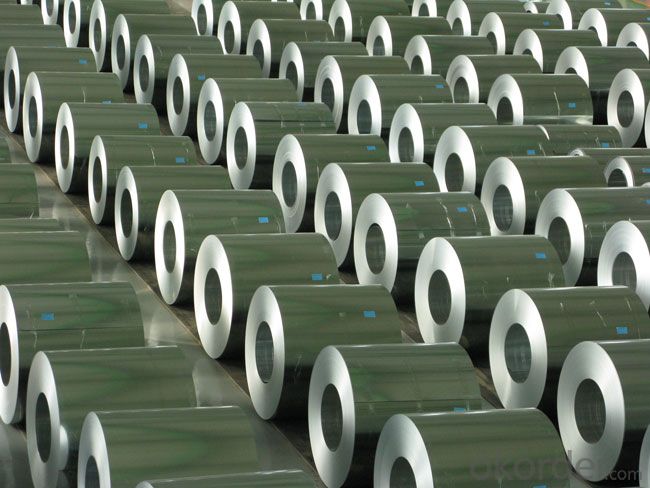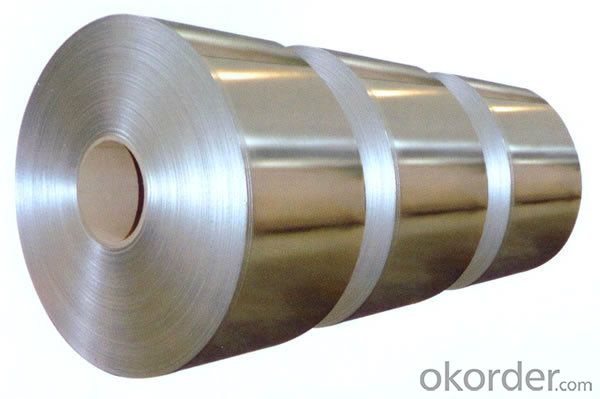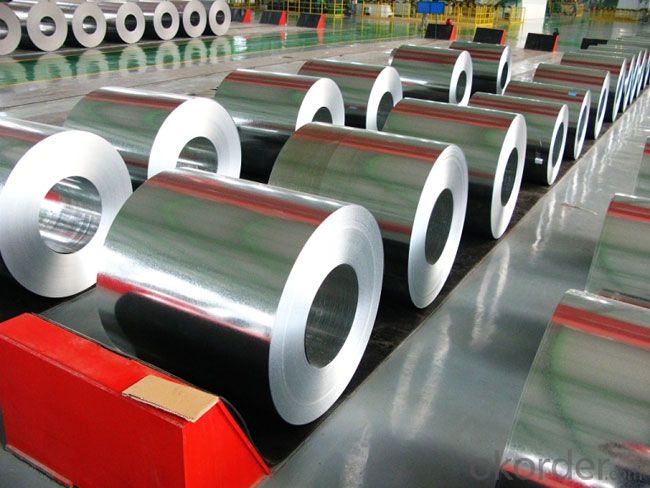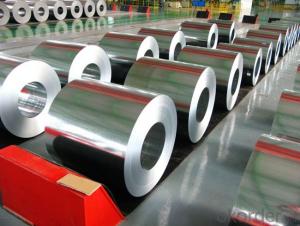EGI Electronic Galvanized Steel Coil Electro
- Loading Port:
- Tianjin
- Payment Terms:
- TT OR LC
- Min Order Qty:
- 25 m.t.
- Supply Capability:
- 10000 m.t./month
OKorder Service Pledge
OKorder Financial Service
You Might Also Like
EGI Electronic Galvanized Steel Coil Electro
Brief Description
Grade: DC51D+Z(St01Z,St02Z,ST03z)
DC51D+ZF
Data for Chemical Element
Steel Grade | Variety | Product Category | Chemical composition % | |||||
C | Mn | P | S | Alt | Ti | |||
DC51D+Z(St01Z,St02Z,ST03z) | Hot dip | Low carbon steel and/or | ≤0.10 | ≤0.5 | ≤0.035 | ≤0.035 | - | - |
Electronic Galvanized Steel Coil Properties
Grade | Tensile Mpa Not lees than | Yield Mpa No lees than | Elongation % Not less than | r value Not less than | n value Not less than | |||
Nominal Thickness mm | ||||||||
<0.60 | 0.60~<1.0 | 1.0~<1.6 | ≥1.6 | |||||
DC51D+Z(St01Z,St02Z,ST03z) | - | 270~500 | 20 | 22 | 22 | 22 | - | - |
Grade Contrast
Q/BQB 420-2003 | Q/BQB 420-2001 | Q/BQB 420-2000 |
DC51D+Z(St01Z,St02Z,St03Z) DC51D+ZF | St01Z,St02Z,St03Z - | DC51D+Z DC51D+ZF |
Picture



- Q:I have never owned a non-stainless steel chef's knife and have been looking at some to buy recently, but all of them have various degrees of wear and use. They say that the wear is normal for non-stainless steel knives, but how can I tell if it is too much wear, or if the blade is clean?
- cold rolled steel waers as you carve meat. If the blad if to thin you may want a better one. Utica knife in utica N.Y. made them up to about 10 years ago and i still buy them at auctions.
- Q:What are the different types of steel coil surface defects?
- There are several different types of steel coil surface defects that can occur during the manufacturing or handling process. Some of the common types include: 1. Rust: Rust is a common surface defect that occurs when the steel coil is exposed to moisture or oxygen. It appears as a reddish-brown discoloration on the surface of the coil. 2. Scratches: Scratches are superficial marks that can occur during handling or transportation of the steel coil. They can vary in depth and severity, ranging from light surface scratches to deep gouges. 3. Stains: Stains are another type of surface defect that can occur due to exposure to chemicals or other substances. They can appear as discolored patches on the surface of the coil, and may be difficult to remove. 4. Roll marks: Roll marks are impressions or indentations that can occur during the rolling process. They are caused by uneven pressure or misalignment of the rolls, and can appear as lines or patterns on the surface of the coil. 5. Edge wave: Edge wave is a defect that occurs when the edges of the coil are not perfectly flat. It can cause the edges to appear wavy or uneven, and may affect the overall appearance and performance of the coil. 6. Oil spots: Oil spots are surface defects that occur when oil or lubricants used in the manufacturing process are not properly removed. They can appear as dark spots or patches on the surface of the coil, and may affect the adhesion of coatings or paints. 7. Pitting: Pitting is a defect that appears as small, shallow depressions or pits on the surface of the coil. It can be caused by factors such as corrosion, uneven cooling, or impurities in the steel. 8. Holes: Holes are more severe surface defects that can occur due to a variety of reasons, such as corrosion, mechanical damage, or manufacturing errors. They can range in size and can significantly affect the structural integrity of the coil. It is important to address these surface defects promptly to ensure the quality and performance of the steel coil. Regular inspections, proper handling, and appropriate surface treatments can help minimize the occurrence of these defects.
- Q:I have a white gold engagement ring, and to be special I thought I'd get a plain band from Tiffany's--in stainless steel. Can stainless steel be worn with white gold or will there be a difference in the color or texture? I'm not planning on getting them soldered together, but I don't want it to be noticeable that they are different metals. Does anyone have experience in this subject?
- Stainless steel is not going to look like white gold. I have some stainless steel pieces from Tiffany (not rings, just earrings and necklaces) and I think they look like.. well, stainless steel. They need to be polished often, and they scratch easily. Thats one thing when youre talking about earrings that just dangle from your ears, but honestly for a ring you are wearing on your hand... I would not go the stainless steel route. I would invest in a better metal that is going to stand the test of time.
- Q:What is steel made of and what is its molecular weight? It's for a project in chemistry class so if you have a website link as well, that would be great!
- Steel is an alloy consisting mostly of iron with a little Carbon thrown in. Steel is not a molecule, therefore, it does not have a molecular weight. Steel contains atoms of iron and carbon in a crystal lattice, along with various other alloying elements such as manganese, chromium, vanadium, and tungsten.
- Q:If steel can rust with saltwater... then why are ships made of steel? can't we just use other metals like aluminium etc?
- Ships are made of steel and also aluminum. Some minesweepers are made from fiberglass. Steel is a comparatively cheap and easily used material. But don't be confused with the type of steel that is used. Plates do not have to be replaced every year. In fact ship s can go for years with no major steel work, and this can be extended with proper maintenance like sand blasting and painting. There are many different steel alloys with different properties. Some of them resist rusting and instead of flaking they just form a powder like barrier. Check out this link.
- Q:Are steel coils used in appliances manufacturing?
- Yes, steel coils are commonly used in appliances manufacturing. They are widely used for constructing the frames, cabinets, and other structural components of various appliances such as refrigerators, washing machines, dishwashers, and ovens. Steel coils provide strength, durability, and stability to these appliances, making them an essential component in their manufacturing process.
- Q:hello, I am trying to figure out what wok to get and came across a website that offers many woks out of different materials. what is the best, or considered original (traditional)? I have a couple of cast iron pots and pans - too heavy, so I am assuming it will take some time for a cast iron wok to heat up. what about carbon steel and stainless steel? Thanks
- Traditionally woks do take a long to heat up but the trick is that they hold the heat for a long time, so either stainless steel for convenience or cast iron for tradition. Don't use anything non stick, chinese cooking uses a lot of oil, the non-stick will just be unhealthy when it starts to burn off. The cast iron will be good because it'll heat up and keep its heat, in chinese homes that have the wok, the wok usually gets heated up throughout a few hours, you need it to be really hot all the way through all over the pan to do chinese cooking. also traditionally woks are built into home or are big and positiioned over a fire not to be moved too much, the point is to keep stiring and stiring and stiring until your food is cooked.
- Q:where can i get a thick sheet of steel ? and is steel bullet proff for example if you shoot a bullet on steel will that bullet bounce right off the steel ?
- Try a local Fastenal store, they can order it for you by the sheet. If that doesnt help, then try a welding or fabricating store.
- Q:Can steel coils be stamped?
- Yes, steel coils can be stamped.
- Q:How are steel coils processed for edge trimming or slitting during processing?
- Steel coils are processed for edge trimming or slitting during processing by utilizing specialized machinery. The coils are unwound and fed into the machine, where the edges are trimmed off to achieve the desired width. For slitting, the coil is passed through multiple sets of circular blades that cut it into narrower strips. This process ensures precise dimensions and smooth edges, making the steel coils ready for further applications.
1. Manufacturer Overview |
|
|---|---|
| Location | |
| Year Established | |
| Annual Output Value | |
| Main Markets | |
| Company Certifications | |
2. Manufacturer Certificates |
|
|---|---|
| a) Certification Name | |
| Range | |
| Reference | |
| Validity Period | |
3. Manufacturer Capability |
|
|---|---|
| a)Trade Capacity | |
| Nearest Port | |
| Export Percentage | |
| No.of Employees in Trade Department | |
| Language Spoken: | |
| b)Factory Information | |
| Factory Size: | |
| No. of Production Lines | |
| Contract Manufacturing | |
| Product Price Range | |
Send your message to us
EGI Electronic Galvanized Steel Coil Electro
- Loading Port:
- Tianjin
- Payment Terms:
- TT OR LC
- Min Order Qty:
- 25 m.t.
- Supply Capability:
- 10000 m.t./month
OKorder Service Pledge
OKorder Financial Service
Similar products
New products
Hot products
Related keywords




























